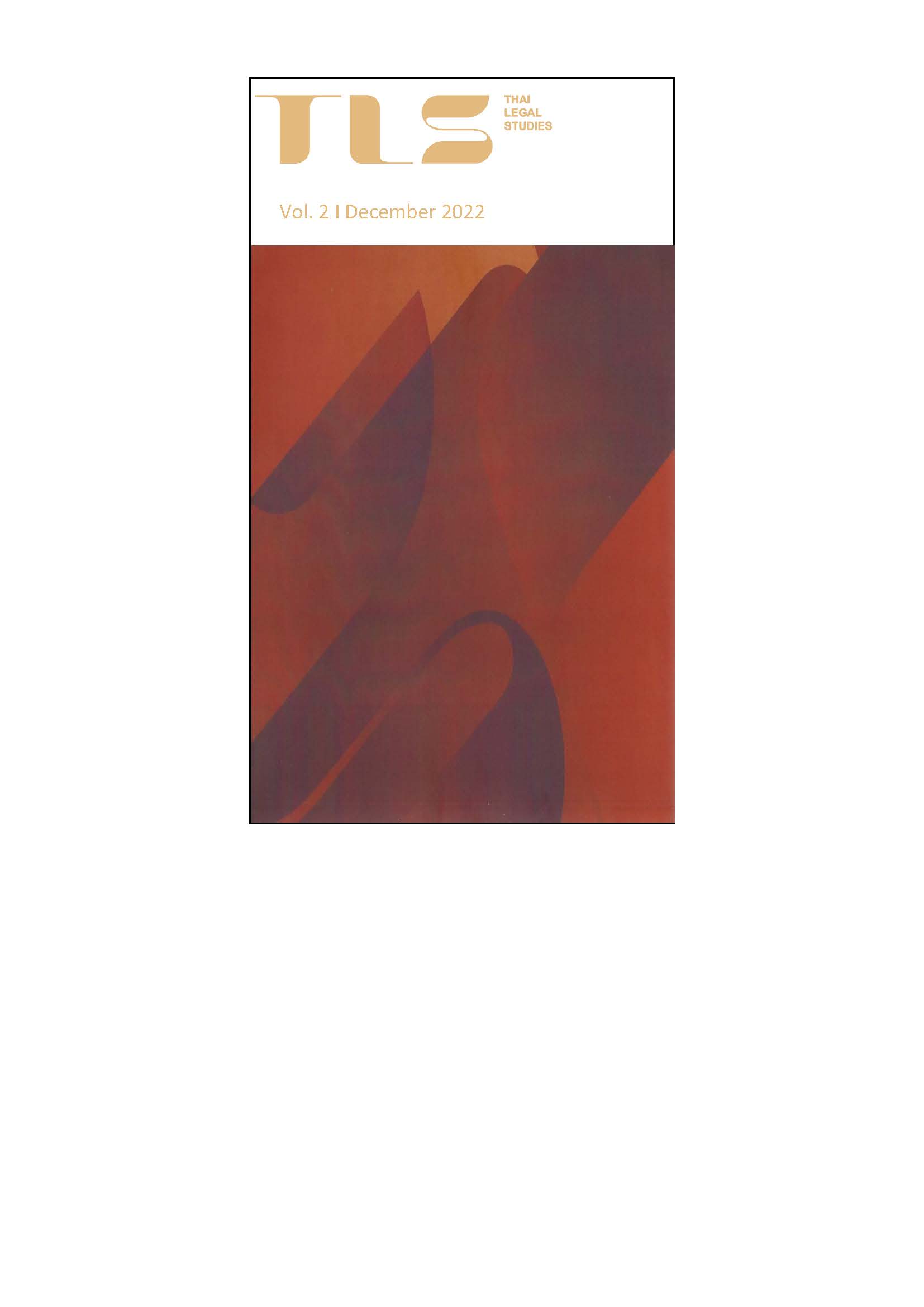Taking Rights Seriously? Recent Shifts in Procedural and Substantive Matters of the Thai Constitutional Court
DOI:
https://doi.org/10.54157/tls.261183Keywords:
Constitutional court, Thai constitutional law, Constitutional rights, Judicial review, Judicial behaviorAbstract
The Thai Constitutional Court has recently dealt with an increased number of cases concerning constitutional rights such as abortion and same-sex marriage, which have gained public attention in a similar way to the Court’s many cases on political issues. This new development may show that the Court is now performing its role as a constitutional guardian and bulwark of rights. However, the expansion of the caseload on rights may promote judicial activism, and thus indicates a new strategy for the Court to become more powerful. This article looks both at the substantive changes in the jurisprudence of the Court as well as the procedural adjustments in recent court cases, in order to determine the extent to which the Court has transformed itself to fit the ideal image of a great constitutional court in a comparative context. The article analyzes all the constitutional rights cases decided since 2019, in order to gauge the overall performance of the Court. Furthermore, the article provides some examples of cases that seemingly protect constitutional rights, but in fact simultaneously serve to expand the future powers of the Court. The analysis then suggests that while the Court might appear to have improved its protection of rights, this comes at a cost – namely, that of a court which is potentially all the more active and politically involved.
References
Arnott, Grady, et al. “Exploring Legal Restrictions, Regulatory Reform, and Geographic Disparities in Abortion Access in Thailand.” (2017) 19(1) Health and Human Rights.
Barroso, Luis Roberto. “Countermajoritarian, Representative, and Enlightened: The Roles of Constitutional Courts in Democracies.” (2019) 67 American Journal Comparative Law 109–43. https://doi.org/10.1093/ajcl/avz009
Bice, Scott H. “The Limited Grant of Certiorari and the Justification of Judicial Review.” (1975) 1975(2) Wisconsin Law Review.
Bickel, Alexander. The Least Dangerous Branch (2nd edn, Yale University Press 1986).
Cepeda-Espinosa, Manuel Jose. “Judicial Activism in a Violent Context: The Origin, Role, and Impact of the Colombian Constitutional Court.” (2004) 3 Washington University Global Studies Law Review 529. https://openscholarship.wustl.edu/law_globalstudies/vol3/iss4/2
Chen, Albert H. Y. “Constitutional Courts in Asia: Western Origins and Asian Practice.” In Chen, Albert H. Y., and Andrew Harding (eds), Constitutional Courts in Asia: A Comparative Perspective (Cambridge University Press 2018). https://doi.org/10.2139/ssrn.3471122
Comella, Víctor Ferreres. Constitutional Courts and Democratic Values: A European Perspective (Yale University Press 2009). https://doi.org/10.12987/yale/9780300148671.001.0001
Connors, Michael K. “Ambivalent About Human Rights: Thai Democracy.” In Thomas W. D. Davis and Brian Galligan (eds), Human Rights in Asia (Elgar 2011). https://doi.org/10.4337/9780857933263.00013
Dahl, Robert A. “Decision-making in a Democracy: The Supreme Court as a National Policy-maker.” (1957) Journal of Public Law (Fall).
Dixon, Rosalind, and Samuel Issacharoff. “Living to Fight Another Day: Judicial Deferral in Defense of Democracy.” (2016) Wisconsin Law Review 683–731. https://doi.org/10.2139/ssrn.2726045
Dixon, Rosalind, and David Landau. Abusive Constitutional Borrowing: Legal Globalization and the Subversion of Liberal Democracy (Oxford 2021). https://doi.org/10.1093/oso/9780192893765.001.0001
Dressel, Björn, and Khemthong Tonsakulrungruang. “Coloured Judgements? The Work of the Thai Constitutional Court, 1998–2016.” (2019) 49 Journal of Contemporary Asia 1–23. https://doi.org/10.1080/00472336.2018.1479879
Fontana, David. “Docket Control and the Success of Constitutional Courts.” In Tom Ginsburg and Rosalind Dixon (eds), Comparative Constitutional Law (Edward Elgar 2011). https://doi.org/10.4337/9780857931214.00043
Gardbaum, Stephen. “What Makes for More or Less Powerful Constitutional Courts.” (2018) 29(1) Duke Journal of Comparative & International Law. https://doi.org/10.2139/ssrn.3050169
Ginsburg, Tom. “Constitutional Afterlife: The Continuing Impact of Thailand’s Postpolitical Constitution.” (2009) 7(1) International Journal of Constitutional Law 83–105. https://doi.org/10.1093/icon/mon031
Ginsburg, Tom, and Mila Versteeg. “Why Do Countries Adopt Constitutional Review?” (2014) 30(3) Journal of Law Economics & Organization 587–622. https://doi.org/10.1093/jleo/ewt008
Haberkorn, Tyrell. In Plain Sight: Impunity and Human Rights in Thailand (University of Wisconsin Press 2018).
Harding, Andrew, and Peter Leyland. The Constitutional System of Thailand: A Contextual Analysis (Hart Publishing 2011). https://ssrn.com/abstract=1895700
Hirschl, Ran. Towards Juristocracy: The Origins and Consequences of the New Constitutionalism (Harvard University Press 2007).
Issacharoff, Samuel. Fragile Democracies: Contested Power in the Era of Constitutional Courts (Cambridge University Press 2015). https://doi.org/10.1017/CBO9781139839334
K. Chaturachinda and N. Boonthai. “A Commentary on the Recent Ruling by the Thai Constitutional Court in Relation to Abortion Law in Thailand.” (2020) 28(1) Sex Reproductive Health Matters 2020. https://doi.org/10.1080/26410397.2020.1776542
Kelsen, Hans. “La Garantie Juridictionnelle de la Constitution.” (1928) 45 Revue de Droit Public.
Khemthong Tonsakulrungruang. “Entrenching the Minority: The Constitutional Court in Thailand’s Political Conflict.” (2017) 26(2) Washington International Law Journal 247. https://digitalcommons.law.uw.edu/wilj/vol26/iss2/4
Khemthong Tonsakulrungruang. “Thailand: An Abuse of Judicial Review.” In Po Jen Yap (ed), Judicial Review of Elections in Asia (Routledge 2016), 173–191. https://doi.org/10.4324/9781315668567-11
Marks, Stephen P. “Emerging Human Rights: A New Generation for the 1980s.” (1981) 33 Rutgers Law Review 435.
McCargo, Duncan. Fighting for Virtue: Justice and Politics in Thailand (Cornell University Press 2020). https://doi.org/10.7591/cornell/9780801449994.001.0001
Mérieau, Eugénie. “The Thai Constitutional Court, a Major Threat to Thai Democracy.” IACL-IADC Blog (3 May 2019). https://blog-iacl-aidc.org/2019-posts/2019/5/3/the-thai-constitutional-court-a-major-threat-to-thai-democracynbsp
“New Law Protects Constitutional Court from Criticism.” Bangkok Post (2018). https://www.bangkokpost.com/thailand/politics/1424702/new-law-protects-constitutional-court-from-criticism
Pandit Chanrochanakit. “Deformed Constitutionalism: Thai-Style Judicialization and the Problem of Parliamentary Supremacy.” (2021) 12 Political Science & Public Administration Chiang Mai University Journal Suppl. https://so05.tci-thaijo.org/index.php/polscicmujournal/article/view/250458
Panthip Pruksacholavit, and Nuno Garoupa. “Patterns of Judicial Behaviour in the Thai Constitutional Court, 2008–2014: An Empirical Approach.” (2016) 24(1) Asia Pacific Law Review 16–35. https://doi.org/10.1080/10192577.2016.1200310
Quint, Peter E. “The Most Extraordinarily Powerful Court of Law the World Has Ever Known—Judicial Review in the United States and Germany.” (2006) 65(1) Maryland Law Review 152. https://digitalcommons.law.umaryland.edu/mlr/vol65/iss1/13
Rawin Leelaparana and Suprawee Asanak. “Constitutional Struggles and Polarised Identities in Thailand: The Constitutional Court and the Gravitational Pull of Thai-Ness upon Liberal Constitutionalism.” (2022) 50(2) Federal Law Review 156–73. https://doi.org/10.1177/0067205X221087476
Sweet, Alec Stone. “Constitutional Courts.” In Michel Rosenfeld and András Sajó (eds), The Oxford Handbook of Comparative Constitutional Law (Oxford University Press 2012). https://doi.org/10.1093/oxfordhb/9780199578610.013.0040
Vitit Muntarbhorn. “Rule of Law and Aspects of Human Rights in Thailand: From Conceptualization to Implementation?” In Randall Peerenboom (ed), Asian Discourses of Rule of Law (Routledge 2004). https://doi.org/10.4324/9780203317938
Waldron, Jeremy. “The Core of the Case Against Judicial Review.” In Jeremy Waldron, Political Political Theory. Essays on Institutions (Harvard University Press 2016). https://doi.org/10.4159/9780674970342-009
Wendel, Luisa, Anna Shadrova, and Alexander Tischbirek. “From Modeled Topics to Areas of Law: A Comparative Analysis of Types of Proceedings in the German Federal Constitutional Court.” (2022) 23(4) German Law Journal 493–531. https://doi.org/10.1017/glj.2022.39
Sources in Thai
“ข่าวสำนักงานศาลรัฐธรรมนูญ 9/2564.” สำนักงานศาลรัฐธรรมนูญ (2564). [“Office of the Constitutional Court’s Press Release 9/2021.” Office of the Constitutional Court (2021).] https://www.constitutionalcourt.or.th/occ_web/download/article/article_20220518135540.pdf
ความมุ่งหมายและคำอธิบายประกอบรายมาตราของรัฐธรรมนูญแห่งราชอาณาจักรไทย 2560. (สำนักงานเลขาธิการสภาผู้แทนราษฎร 2562). [Intents and Explanations of Each Provision of the Constitution of 2017. (Office of the Secretary of the House of Representative 2019).]
จักรี นะวาระ. “การให้สิทธิบุคคลในการยื่นคำร้องต่อศาลรัฐธรรมนูญตามรัฐธรรมนูญแห่งราชอาณาจักรไทย พ.ศ. 2550 มาตรา 212.” (วิทยานิพนธ์, มหาวิทยาลัยธรรมศาสตร์ 2552). [Chakree Nawara. “Granting the Right to an Individual to File a Complaint with the Constitutional Court According to Section 212 of the 2007 Constitution.” (LLM dissertation, Thammasat University 2009).]
เฉลิมพงศ์ เอกเผ่าพันธุ์. “การคุ้มครองสิทธิเสรีภาพของประชาชนตามรัฐธรรมนูญโดยศาลรัฐธรรมนูญ.” (วิทยานิพนธ์, มหาวิทยาลัยธรรมศาสตร์ 2548). [Chalermpong Ekpaopun. “The Protection of Constitutional Rights and Liberty by the Constitutional Court.” (LLM dissertation, Thammasat University 2005).] https://digital.library.tu.ac.th/tu_dc/frontend/Info/item/dc:114484
ธงชัย วินิจจะกูล. นิติรัฐอภิสิทธิ์และราชนิติธรรม (คณะเศรษฐศาสตร์ มหาวิทยาลัยธรรมศาสตร์ 2563). [Thongchai Winichakul. Rule of Law, Privilege, and Royal Rule of Law (Faculty of Economics, Thammasat University 2020).]
ธนรัตน์ ทั่งทอง. “วิชากฎหมายรัฐธรรมนูญ.” เนติบัณฑิตยสภา (2562). [Thanarat Thangthong. “Constitutional Law Lecture.” Thai Bar Association (2019).]
“เปิด 5 ปมปัญหา หลัง ‘ศาลปค.’ รื้อคดี ‘โฮปเวลล์’ ใหม่.” สำนักข่าวอิศรา (2565). [“Five Problems After the Administrative Court Gave a Retrial of Hopewell.” Isranews (2022).] https://www.isranews.org/article/isranews-news/110560-supreme-admincourt-hopewell-law-news.html
“เปิดสามเหตุผลศาลรัฐธรรมนูญไม่รับคำร้องประชาชน กรณีถูกละเมิดสิทธิเสรีภาพตามรัฐธรรมนูญ.” iLaw (2561). [“Three Reasonings the Constitutional Court Used in Dismissing Cases Filed by the People Regarding the Violation of Rights.” iLaw (2018).] https://ilaw.or.th/node/4743
ภาสพงษ์ เรณุมาศ. “สถิติคำวินิจฉัยของคณะตุลาการรัฐธรรมนูญและศาลรัฐธรรมนูญ (ตั้งแต่อดีต ถึงพ.ศ. 2556).” (2556) 43 วารสารศาลรัฐธรรมนูญ. [Passapong Renumas. “Statistics of the Constitutional Tribunal and the Constitutional Court (From the Past to 2013).” (2013) 43 Constitutional Court Journal.]
“รายงานการตั้งข้อหาทางการเมืองหลังรัฐประหาร 2557.” ศูนย์ข้อมูลกฎหมายและคดีเสรีภาพ (2562). [“Report on Political Charges After the 2014 Coup.” Freedom of Expression Documentation Center (2019).] https://freedom.ilaw.or.th/politically-charged?fbclid=IwAR1PcRLQXvOEjF1z_4R7hmVld7LcArClPzx_yrfeCKgiRCMr0K29LGued-M
รายงานประจำปี 2563. (สำนักงานศาลรัฐธรรมนูญ, 2564). [Annual Report of the Constitutional Court, 2020. (The Office of the Constitutional Court 2021).]
วจนา วรรลยางกูร. “ศาลรัฐธรรมนูญแบบไหนที่สังคมไทยต้องการ?” [Wajana Wanlayangkoon. “What Kind of a Constitutional Court Is Desired by Thai People?”] The 101 World (2021). https://www.the101.world/constitution-dialogue-constitutional-court
“วรเจตน์ ภาคีรัตน์: ‘ไม่มีศาลรัฐธรรมนูญเสียดีกว่า’.” ประชาไท (2559). [“Interview with Worachet Pakeerut: ‘It Should Be Better Without the Constitutional Court’.” Prachatai (2016).] https://prachatai.com/journal/2016/02/63944
“ศาลจังหวัดหัวหิน มีคำพิพากษา ‘ยกฟ้อง’ พญ.ศรีสมัย ในข้อกล่าวหาทำแท้งผิดกฎหมาย.” เครือข่ายอาสา RSA. [“Hua Hin Provincial Court ‘Acquitted’ Dr. Srisami for Illegally Providing an Abortion.” RSA Thai] (2020). https://www.rsathai.org/contents/17496/
“สถิติคดีของศาลรัฐธรรมนูญ.” วิทยาลัยศาลรัฐธรรมนูญ. [“Statistics of Constitutional Court Cases.” College of the Constitutional Court.] https://www.constitutionalcourt.or.th/ewtadmin/ewt/occ_web/ewt_news.php?nid=773
สำนักงานศาลรัฐธรรมนูญ. การให้สิทธิประชาชนฟ้องศาลรัฐธรรมนูญ: กรณีละเมิดสิทธิเสรีภาพตามรัฐธรรมนูญ. (สำนักงานศาลรัฐธรรมนูญ 2548.) [Office of the Constitutional Court. Granting the Right to an Individual to File a Complaint With the Constitutional Court: In Cases of Violation of Constitutional Rights. (Office of the Constitutional Court 1998).]
สำนักงานศูนย์วิจัยและให้คำปรึกษาแห่งมหาวิทยาลัยธรรมศาสตร์. สิทธิของประชาชนและชุมชนในการฟ้องร้องหน่วยงานของรัฐ ให้ปฏิบัติตามรัฐธรรมนูญแห่งราชอาณาจักรไทย พุทธศักราช 2560 มาตรา 51 และพระราชบัญญัติ ประกอบรัฐธรรมนูญ ว่าด้วยวิธีพิจารณาของศาลรัฐธรรมนูญ พ.ศ. 2561 มาตรา 45. (สำนักงานศาลรัฐธรรมนูญ 2563). [Thammasat University Research and Consultancy Institute. Rights of Individuals and Communities to File a Complaint to Public Organizations to Comply with Section 51 of the Constitution of 2017 and section 45 of the Organic Act on Procedures of the Constitutional Court 2018. (Office of the Constitutional Court 2020).]
สุรพล นิติไกรพจน์. “บทบาทและหน้าที่ของผู้ตรวจการแผ่นดินภายใต้รัฐธรรมนูญใหม่.” (2560) 10(1) วารสารสำนักงานผู้ตรวจการแผ่นดิน. [Surapon Nitikraipot. “Roles and Functions of the Ombudsman Under the New Constitution.” (2017) 10(1) Office of Ombudsman Journal.]
อุดม รัฐอมฤต และคณะ. การอ้างศักดิ์ศรีความเป็นมนุษย์หรือใช้สิทธิเสรีภาพของบุคคลตามมาตรา 28. (สำนักงานศาลรัฐธรรมนูญ, 2544). [Udom Rathamarit et al. “The Use of Human Dignity, Rights and Liberties of the People Pursuant to Section 28.” (Office of the Constitutional Court 2001).]
Published
Issue
Section
License
Copyright (c) 2023 Apinop Atipiboonsin

This work is licensed under a Creative Commons Attribution 4.0 International License.
Authors retain copyright and publishing rights without restrictions, but grant Thai Legal Studies the right of first publication in English and to distribute the work under a Creative Commons Attribution 4.0 International Public License (“CC BY 4.0”). It allows others to freely share the work, including the making of translations. There is no charge or fee for readers to immediately view published articles or content, and users are allowed to read, download, copy, distribute, print, search, link to the full texts of the articles, or use them for any other lawful purpose, without asking prior permission from Thai Legal Studies or the author(s), the only requirement being that an acknowledgement is given of the work’s authorship and its initial publication in English by Thai Legal Studies.







